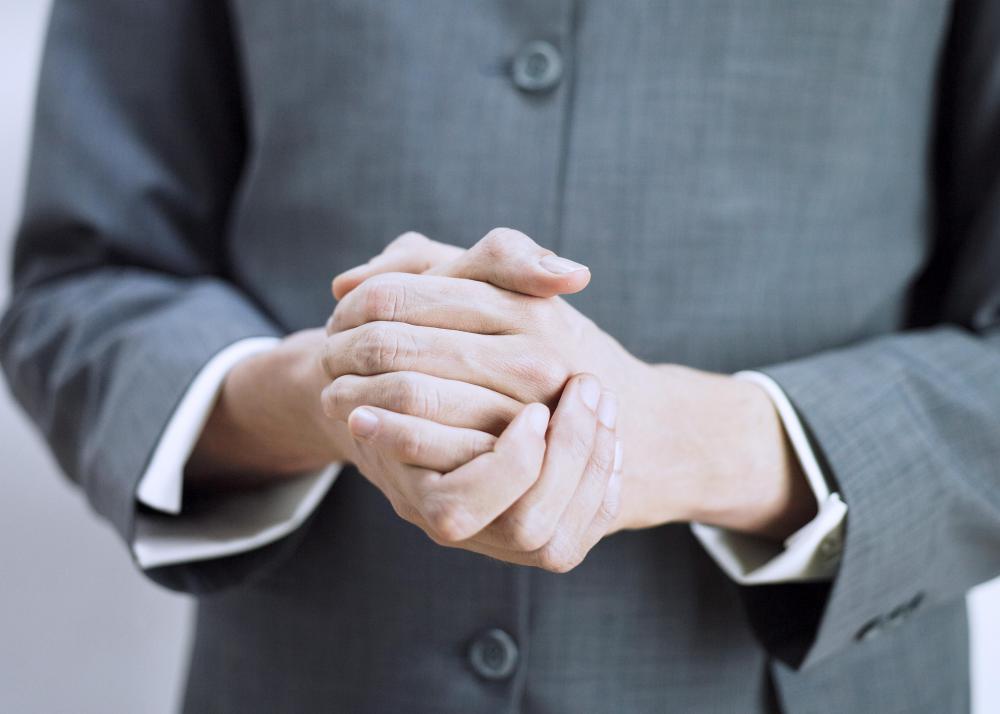At WiseGEEK, we're committed to delivering accurate, trustworthy information. Our expert-authored content is rigorously fact-checked and sourced from credible authorities. Discover how we uphold the highest standards in providing you with reliable knowledge.
What is the Connection Between Anxiety and Dry Mouth?
The relationship between anxiety and dry mouth is a complex matter that involves many factors. Sometimes, the body responds to stress by producing certain chemicals that can regulate saliva flow. At other times, behaviors associated with anxiety, such as heavy mouth breathing during panic attacks, dry out the mouth. Alternately, the very treatments for anxiety may again affect saliva-regulating chemicals and create dry mouth.
One thing under continued study is the way stress acts on the neurotransmitter acetylcholine (ACh) and the enzyme that is produced to break it down, called acetylcholinesterase (AChE). ACh, in part, helps to regulate saliva. When a person is under stress, the amount of AChE may be higher than normal and reduce ACh. This is a direct connection between anxiety and dry mouth. If anxiety creates AChE, the mouth is likely to be drier.

Another causal connection is the way people may breathe if they are deeply anxious. Many stressed people breath more rapidly through the mouth, and some people with panic attacks do a significant amount of rapid mouth breathing during hyperventilation. An open mouth through which air flows constantly is likely to be fairly dry, which may exacerbate a problem already present due to high AChE levels.

People also develop stress coping mechanisms that may dry out the mouth. Things like smoking or drinking create drier mouth conditions. Depending on how often these behaviors are engaged in, they may worsen not only the dryness of the mouth, but also anxiety symptoms.
Ironically, medically accepted means of treating anxiety do little to relieve dry mouth. Most drugs used to calm anxiety cause dry mouth by acting on acetylcholine and reducing its. This is true of benzodiazepines like diazepam, oxazepam, alprazolam, and clonazepam, and some of the selected serotonin reuptake inhibitors (SSRIs) used to treat anxiety. It also applies to atypical antipsychotics that are occasionally used in severe panic disorder, obsessive-compulsive disorder, post traumatic stress syndrome, and generalized anxiety disorder.
There are some medications that can be prescribed to help moisten the mouth, and these may be of use. People can also help relieve some dry mouth symptoms by drinking plenty of liquids each day and avoiding beverages that contain caffeine. Should anxiety and dry mouth continue to be a problem, it’s important for the person to see a dentist regularly. Without adequate saliva in the mouth, tooth decay occurs more readily.
AS FEATURED ON:
AS FEATURED ON:












Discussion Comments
@ysmina-- I'm exactly the opposite. I get severe dry mouth from anxiety and stress, particularly before I have to give a presentation or speak at a meeting. It comes on very suddenly and makes it very hard for me to speak.
I just hate giving presentations because I get really wired up and stressed. And because of my dry mouth, I have to stop every five minutes and drink something.
@ysmina-- Unfortunately, that's the case with many antidepressants and anti-anxiety medications. My dry mouth symptoms have lessened over time though, so hopefully they will for you as well.
Drinking liquids and eating candy are great ideas. I personally chew gum and drink a lot of water. I've noticed that anxiety medications make my dry mouth and thirst worse at night, so I make sure that I have a bottle of water next to my bed.
I also try and drink herbal teas without caffeine. Caffeine is a diuretic so regular tea and coffee increase dry mouth. I drink caffeine-free green tea or chamomile tea.
Oh and I also avoid salty foods.
I have an anxiety disorder. I never had dry mouth until I started taking anti-anxiety medications. These drugs turn my mouth into a desert. I have to sip on liquids and suck on sugar-free candy throughout the day.
Post your comments